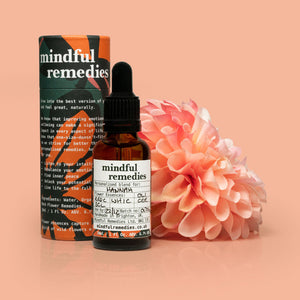your basket
- choosing a selection results in a full page refresh

Overthinking refers to the tendency of excessively analysing, replaying and dwelling on past events, future possibilities, and present situations. It involves overanalysing every detail, questioning decisions, and getting stuck in repetitive thought patterns. Overthinking often leads to a state of mental rumination, where individuals become trapped in their thoughts, unable to find resolution or peace of mind.
Overthinking has become increasingly prevalent in today's fast-paced and demanding society. With the rise of social media, constant connectivity, and the pressure to succeed, many individuals find themselves caught in the cycle of overthinking. The constant bombardment of information, comparison to others, and the need to make quick decisions contribute to heightened levels of overthinking.
Overthinking can have significant negative effects on mental health and overall wellbeing. It often leads to heightened anxiety, stress and even depression. The constant mental chatter and self-doubt can exhaust individuals, leaving them feeling emotionally drained and mentally overwhelmed. Moreover, overthinking can interfere with decision-making abilities, productivity, and interpersonal relationships, leading to a decrease in overall life satisfaction.
In this blog post we’ll explore the causes of overthinking, some strategies to help lessen their impact on everyday life and introduce you to Bach flower remedies (in particular White Chestnut) which are a natural solution to help calm an overactive mind and promote emotional balance.

Perfectionistic tendencies and the fear of failure can drive individuals to overthink. The relentless pursuit of flawlessness and the avoidance of making mistakes can create a constant need for reassurance and validation. This fear of failure can fuel overthinking, as individuals obsessively analyse and second-guess their choices, actions, and abilities.
Low self-confidence and self-esteem can contribute to overthinking. When individuals doubt their worth and abilities, they often engage in excessive self-criticism and over-analysis. They may constantly seek external validation and even minor setbacks or criticisms can trigger a cycle of negative thoughts and overthinking.
Past traumatic experiences or negative events can haunt individuals and lead to overthinking. Painful memories or unresolved emotional wounds may resurface repeatedly, causing individuals to replay and analyse the events, searching for answers or closure. The inability to let go of the past can contribute to persistent overthinking patterns.
High levels of stress and anxiety can intensify overthinking tendencies. Stress triggers a heightened state of alertness and hyper-vigilance, leading individuals to overanalyse and anticipate future challenges or threats. The racing thoughts and constant worry associated with anxiety often fuel overthinking, making it difficult to relax and find mental clarity.
In today's digital age, the constant exposure to technology and information overload can overwhelm individuals and contribute to overthinking. Social media platforms, news outlets and instant communication channels bombard individuals with a constant stream of information and comparisons. The fear of missing out (FOMO) and the pressure to keep up with the fast-paced world can lead to overthinking and a constant need for mental stimulation.
Understanding the causes of overthinking is crucial in developing effective strategies to manage and alleviate its negative impact. By addressing these underlying factors, individuals can take steps towards finding peace of mind and breaking free from the cycle of overthinking.
Mindfulness and meditation are powerful tools for managing overthinking. By cultivating present-moment awareness, individuals can detach from racing thoughts and anchor themselves in the present. Mindfulness practices, such as deep breathing exercises or body scans, help calm the mind and create a sense of inner peace. Regular meditation sessions can train the mind to observe thoughts without judgment, reducing the tendency to get caught up in overthinking patterns.
Overthinking often stems from negative thought patterns and irrational beliefs. One effective strategy is to challenge these thoughts and replace them with more realistic and positive alternatives. Cognitive restructuring involves identifying and questioning negative thoughts, examining the evidence for and against them, and reframing them in a more balanced and constructive way. This process helps individuals gain perspective and break free from the cycle of overthinking.
Physical exercise and relaxation techniques have profound benefits for managing overthinking. Regular exercise releases endorphins, reduces stress and improves overall wellbeing. Engaging in activities such as yoga, tai chi, or deep breathing exercises promotes relaxation and helps calm an overactive mind. By focusing on the body's sensations and movement, individuals can shift their attention away from overthinking and experience a sense of tranquillity.

Opening up to someone you trust can offer a fresh perspective and emotional support. A therapist can provide professional guidance, teach coping skills and help individuals explore the underlying causes of overthinking as well as developing personalised strategies to manage overthinking effectively.
By implementing these coping strategies, individuals can regain control over their thoughts, reduce overthinking and cultivate a more peaceful and balanced state of mind. It's important to remember that overcoming overthinking is a process and it may take time and practice to find the strategies that work best for each individual.
Bach Flower Remedies are a natural healing system developed by Dr Edward Bach in the early 20th century. The flower remedy system consists of 38 different flower essences that aim to restore emotional balance. Each remedy is associated with specific emotional states and is used to address various emotional and mental concerns.
The White Chestnut Bach Flower Remedy is associated with overthinking and an overactive mind. It is used to promote mental clarity, calmness, and the ability to let go of repetitive thoughts. White Chestnut helps individuals quiet their racing minds, find inner peace, and break free from the cycle of overthinking.
White Chestnut can help individuals disengage from repetitive, unwanted thoughts and mental chatter. It supports the mind in finding stillness and creating space for more productive and positive thinking. By calming the overactive mind, White Chestnut enables individuals to gain clarity, make decisions more easily and experience greater mental tranquillity. It's also great for insomnia to help calm your brain and allow you to dose off to sleep.
At Mindful Remedies you can create a personalised remedy blend including up to 7 remedies in a treatment bottle. If description above resonates with you, simply click on the button below to add it to your bottle. Keep scrolling below to see some more remedy suggestions for overthinking.

In addition to White Chestnut Bach Flower Remedy, there are several other remedies that can effectively complement its use in addressing the underlying causes of overthinking. Here are a few Bach Flower Remedies that can be beneficial for specific aspects associated with overthinking:
Rock Water is for individuals who hold high standards and expectations for themselves. It’s particularly helpful for perfectionists who are overly self-disciplined, rigid, and self-critical. Rock Water helps individuals find a balance between self-improvement and self-acceptance, reducing the need for constant perfection and alleviating the pressure that can contribute to overthinking.
Mimulus is recommended for people who experience specific fears and anxieties. It is beneficial for those who tend to overthink and worry about specific things, such as health, finances, or social situations. Mimulus helps individuals confront and manage their fears, providing courage and inner strength to face challenges and reduce the tendency to overanalyse potential negative outcomes.
Star of Bethlehem can be helpful for people who have experienced past trauma or shocking events. It supports emotional healing by addressing the effects of trauma on the mind and body. Star of Bethlehem helps individuals process and release painful memories, reducing the intrusive thoughts and emotional triggers that contribute to overthinking.
Honeysuckle is for people who dwell on past events or long for the past. It helps individuals live in the present and embrace the possibilities of the future. Honeysuckle supports letting go of the past, reducing the inclination to constantly replay past events in the mind, and allowing individuals to focus on the present moment.
Pine is helpful for people who have a tendency to be overly self-critical and burdened by guilt. It helps individuals develop self-acceptance and compassion, reducing the negative self-talk that fuels overthinking.
Cerato is recommended for individuals who lack trust in their own judgment and constantly seek validation from others. It helps individuals tap into their inner wisdom and intuition, fostering self-confidence and reducing the need to overthink and rely on external input.
Larch can help with a lack self-confidence. It supports people in believing in their own abilities and taking appropriate risks, reducing self-doubt and negative self talk.
Vervain Bach Flower Remedy is suitable for people who are highly driven, ambitious and passionate. It helps individuals find balance and temper their enthusiasm, reducing stress and the tendency to overthink due to excessive excitement or overcommitment. Vervain promotes a calmer and more focused approach to life.
Using multiple Bach Flower Remedies alongside White Chestnut can be really helpful to address the specific emotional states and tendencies that contribute to overthinking. Combining multiple remedies can help address the multifaceted aspects of overthinking. There are 38 different remedies in total. Click on the link below to view the descriptions of all 38 remedies.

Bach Flower Remedies are available in a liquid tincture, which can be taken orally or added to water. When combining with other remedies in a treatment bottle, the recommended dosage for Bach Flower Remedies is a minimum of four drops, four times a day.
Bach Flower Remedies are generally considered safe with no known side effects or contraindications. They are gentle and non-toxic, making them suitable for people of all ages, including children and pets. However, it is always recommended to consult a healthcare professional if you have any specific medical conditions or allergies. Bach Flower Remedies are not a substitute for professional medical or psychological treatment and they should be used as a complementary approach to overall wellbeing.
If you’re interested in trying Bach flower remedies, you can create a personalised remedy combining up to seven remedies in a bottle, through Mindful Remedies. Either select remedies using the buttons above or view all 38 remedies below.
view all 38 flower essences
Incorporating Bach Flower Remedies into a self-care routine can be a beneficial way to address overthinking and cultivate mental tranquillity. Here are a few suggestions on how to integrate it into your daily life:
Remember that self-care is a holistic practice, and incorporating Bach Flower Remedies is just one aspect of nurturing your wellbeing. Combine it with other coping strategies mentioned earlier, such as mindfulness, challenging negative thoughts, physical exercise, seeking support, and engaging in hobbies, to create a comprehensive self-care routine that addresses overthinking from various angles.
By incorporating White Chestnut and other Bach Flower Remedies into your self-care routine, you can harness their potential to promote a calmer mind, break free from overthinking patterns and cultivate a greater sense of mental peace and wellbeing.

Since 2021, Lucy Edwards, a qualified Bach Flower Practitioner and the driving force behind Mindful Remedies, has connected with clients across the world. Crafting thousands of personalised remedies, Lucy has supported individuals' emotional wellbeing, shipping remedies to far-flung places like the USA, Thailand, and Australia.
Lucy is readily available for conversations, offering personalised advice to guide you on the path to holistic wellness. It's important to note that she's not only qualified but also registered with the Bach Centre, ensuring that every consultation and remedy adheres to Dr Bach’s original guidelines for expert care and efficacy.



